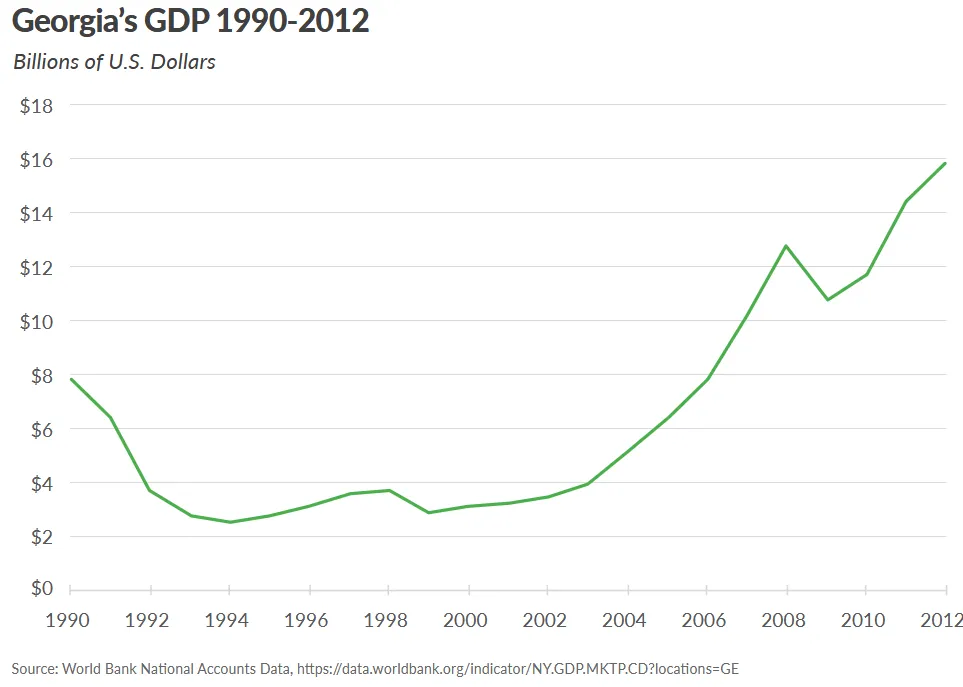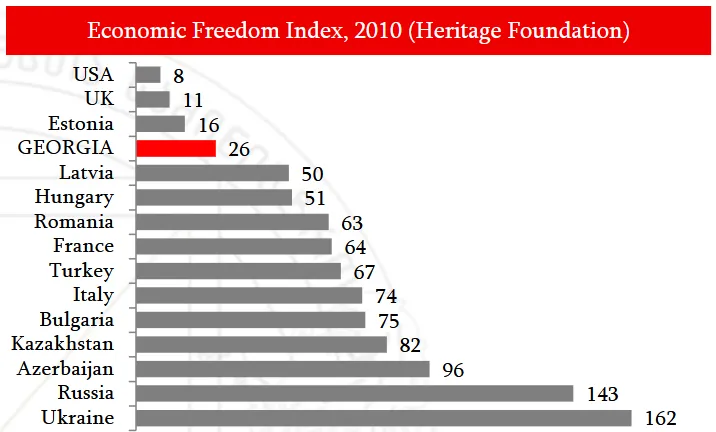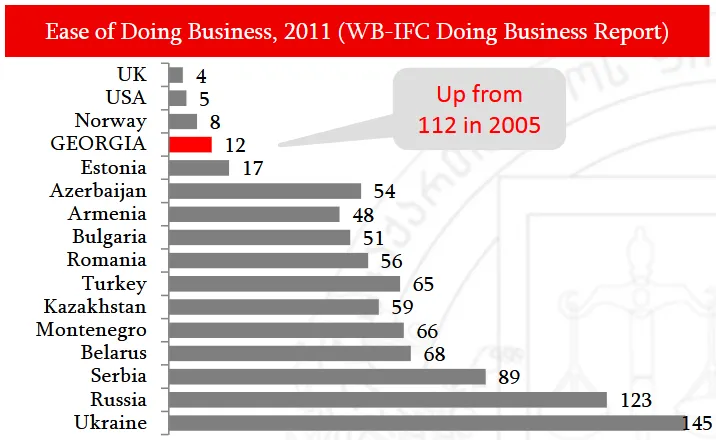I recently read an insightful book, Why Georgia Has Succeeded, by Larisa Burakova, which explores the reforms Georgia undertook in the 2000s. A central figure in this process was the libertarian Kakha Bendukidze, whose influence led the political elite to embrace libertarianism as a guiding ideology. While Georgia didn’t become a libertarian country, the reforms successfully transformed the ruins of the Soviet legacy into a free market economy.
To introduce this story - little-known in the West - I'll share the most interesting quotes from the book along with my own commentary as a person who spent plenty of time in Georgia in the 2000s and witnessed the changes.
After the USSR
What seemed impossible in the early 1980s happened - the Soviet regime collapsed, Georgia held free elections, and soon declared independence from the USSR.
People could make business legally since then, and the borders with the outside world were opened — this alone was enough to make people feel euphoric. The nation long accustomed to Soviet-era shortages of basic goods was now entering an era of abundance - small-scale retail began to grow explosively.
But something went wrong.
Firstly, the Red Empire’s defensive mechanisms kicked in — conflicts erupted in two Georgian regions, with Russian weapons turned against Georgia.
The solution to the main problem - secession from the USSR - also shattered political unity and led to armed conflict between two opposing factions.
As a result, Georgia plunged into poverty and was pulled back into Russia’s orbit by 1993.
Before the Reforms
The growing chaos led to the transfer of power to Eduard Shevardnadze, who had ruled the republic during the Soviet era. People hoped his experience and international connections would benefit the country, but he failed to revive the ruined country.
Electricity, water, and gas were supplied intermittently even in the capital; in the province, power was only available for eight hours a day, and in some areas, there was no electricity for 2-3 months.
Georgia's government institutions remained virtually unchanged since Soviet times — a bloated bureaucracy handing out countless licenses and permits, all for a bribe. Here’s what is written about it in Why Georgia Has Succeeded:
Georgia was lucky in the sense that everything Soviet collapsed very quickly. But along with it, our integrity fell apart, our energy grid collapsed, our education and law enforcement systems broke down, and no new system of governance was created. Everything was destroyed, but that meant the construction site was cleared. When there’s no electricity supply, when it’s dangerous to go outside, when tomorrow doesn’t exist — it’s hard not to crave not just reforms, but radical reforms. In such conditions, people will follow anyone who offers a radical, positive reform plan. And we offered one.
Shevardnadze’s main achievement was a relative freedom of the press and domestic politics. This created the foundation for a new generation of political leaders to emerge.
Libertarianism as a Guiding Ideology
In 2003, popular dissatisfaction led to a peaceful revolution, bringing a new generation of politicians, led by Mikheil Saakashvili, to power.

Mikheil Saakashvili, after his election to a second term, in 2008. Photograph: Jam News
The new president began building a team mostly composed of those educated in the West during the 1990s, as well as businessmen who had achieved success either in Georgia or abroad. Kakha Bendukidze was among the latter, and he was the one who brought libertarianism as a guiding ideology to the Georgian political elite of the 2000s. I've found the answer to how exactly it happened in Burakova's book:
“Right after the revolution, we all understood that we had to build something new, that the old system didn’t work, and we definitely knew we had to fight corruption. But how to do reforms and for what purpose — it wasn’t clear. We thought we must create a new state structure, but what kind exactly — we didn’t really understand.
We started doing things and then realized that without a leading, dominant ideology, reforms were basically impossible: ministers' actions could contradict each other. Both might be doing something good, new, and non-corrupt, but ideologically it could be incompatible. Only in the second half of 2004 did we start to consolidate and crystallize our ideology.”
And Kakha Bendukidze, with his scandalous phrase “You can sell everything except your conscience,” played no small role in that. What we hadn’t yet articulated — the intuitive shift toward libertarian economics — was crystallized by that phrase, which later served as an ideological foundation.

Kakha Bendukidze. Photograph: Meduza
A perfect example of the role of the individual in history. Let me briefly quote Wikipedia to introduce you to Kakha Bendukidze, whom The Washington Post nicknamed "the godfather of Georgian reforms":
He was known as a committed libertarian and strong supporter of market economy, deregulation and privatization, stating that the Georgian government should sell everything except its honor. During 2004–2007, under his leadership, Georgia became the top-reforming country in the world, according to the World Bank's Ease of doing business index report. In particular, Georgia jumped from 137th to 11th on the ease of doing business scale, ahead of Germany and France.
Bendukidze was entrusted with leading the reforms as Minister for Reform Coordination. He articulated his political vision as follows:
"The individual is the measure of all things. Therefore, at the heart of our approach to reforms is the desire to put people at the center of a changing world, not to hinder them from changing this world and making decisions independently".
Cutting the Number of Officials
This is how Burakova’s book describes the state of Georgia’s government system before the reforms as follows:
The state had accumulated so many regulatory bodies and inspections that even the regulators themselves sometimes didn't know the limits of their authority and would pass responsibility on to each other. Functions were often duplicated, and this was most often accompanied by a lack of any control.
Upon becoming minister, Bendukidze gave a simple task:
"You need to choose smart people." As a result, out of nearly a thousand employees already working [in his Ministry], no more than fifty remained. After a rigorous selection process, completely new people joined them, including some who came straight from university.
Some departments were simply liquidated to dismantle the reproduction of corruption, and a new structure was formed instead, smaller in size and mostly composed of people who had not worked in government before – businessmen, NGO representatives, students, etc.
This radical approach was justified by the fact that Georgia had done practically no reform of its state institutions since the Soviet era:
"Of course, in a well-functioning society, you can't do that. In this sense, our radicalism was based, among other things, on an awareness of the depth of the crisis," Bendukidze noted in this regard.
Police Reform - 15,000 Fired in One Day
One of the key reforms took place in the Georgian police force, which had been a symbol of corruption even in Soviet times, and by 2003 had become completely entangled with the criminal underworld.
This is what the reformers did:
“We didn’t listen to the advice of well-meaning Europeans who suggested gradual reforms. We acted very harshly and fired 15,000 people from the Ministry of Internal Affairs in one day.”
They replaced the old police officers with young people who had no experience with corruption. The police force was significantly downsized, which made it possible to raise salaries.
Although the police force has become smaller, the crime rate has dropped sharply. After all, corrupt police is one of the main generators of crime. Thus, the police, formerly the object of hatred of the population, suddenly became the country's favorite:
In October 2010, the International Republican Institute recorded public trust in the police at 84% - in 2003, it was just 5%.
As a witness of that time in Georgia, I can confirm: the Georgians were happy about these changes - I often heard people proudly say that they no longer needed to lock their cars — no one was stealing or breaking into them anymore.
Licenses and Permits Cut by 85%
State licenses and permits used to paralyze business and create opportunities for corruption. For example, if you had a farm with a hundred chickens or twenty pigs, you had to get an environmental permit. You needed a license for livestock, beekeeping, a fish farm, etc - there were 300 types of state licenses and 600 permits.
“You should have seen their faces when Kakha told them to their faces that this license wasn’t needed. These people lived off it: they had low salaries, but they issued licenses.”

Kakha Bendukidze. Photograph: Facebook
A society rejuvenated by wide-ranging reforms usually benefited whenever another control body was abolished. Abolition of mandatory vehicle inspections, for example, resulted in fewer traffic fatalities:
Despite abolishing the traffic police and mandatory vehicle inspections, the number of traffic fatalities per 1,000 vehicles dropped from 1.79 in 2003 to 1.05 in 2010.
The more complex and expensive the system of government licenses and permits, the more beneficial it is for large businesses, as the costs of licenses are negligible for them but help shield the market from smaller competitors. And in this way, it harms competition, the key regulating force in a free economy.
The reformers left only 15% of licences and permits, mostly connected to health care and state security.
Privatization
Georgia was a country with a large amount of state-owned property - a legacy of Soviet times, when private business was illegal.
Kakha Bendukidze explains:
“Privatization produces three results. Firstly, it is budget revenue. Secondly, it is the transformation of property from state to private, which in turn leads to a more efficient private sector. And thirdly, privatization means a fight against corruption, which inevitably appears wherever money meets the state”.
Privatization wasn't always easy, especially when it came to strategic sectors such as energy. Despite this, the reformers succeeded: the sale of state assets brought in $1.44 billion over 5 years after the reformers came to power, which is 23 times more than the sale of state assets brought in over 5 years before the reforms.
In fact, $1.44 billion isn't a large amount, but keep in mind, the country had gone through a period of wars and lived in devastation for ten years. Many properties had deteriorated or lost their economic relevance. Investors were simply afraid to enter such a country. As a result, the reformist government sold some state properties for symbolic sums, but the sale agreements often included a clause requiring the buyer to develop the purchased property.
Taxation
A full tax amnesty allowed businessmen to return to the legal field. Burakova quotes President Mikheil Saakashvili:
"We forgave people’s old tax debts. The previous government criminalized all entrepreneurs, saying: “We’re holding you by the ears—if you don’t pay bribes and show loyalty, we’ll destroy you whenever we feel like it."
Taxation was simplified to include only:
- a 20% flat personal income tax
- a 15% corporate tax
- an 18% value-added tax
- a property tax. For families whose annual income is below $36,000, it is in the range between 0.05% - 0.2% of the market value of the taxable property as stated in the Tax code of Georgia
- excise only on cars, fuels, alcohol, tobacco
- customs duties, from 0% to 12%, mostly 0%
Moreover, people running family businesses — numerous small restaurants, bakeries, homestays, etc - were exempt from income tax, as noted in Why Georgia Has Succeeded:
An individual entrepreneur (a so-called microbusiness with annual revenue under $20,000) was fully exempt from income tax.
As a result, Georgia ranked fourth in Forbes’ 2009 Tax Misery Index — for countries with the lightest tax burden, as Burakova notes in Why Georgia Has Succeeded.
The Antimonopoly Agency Was Shut Down
The agency was shut down, and a new one was created to substitute for it - the agency for competition and free trade. Its role was not to monitor businesses, but to oversee government institutions. Kakha Bendukidze explained this well in an interview for Ekho Kavkaza:
The market-based emergence of monopolies, which left-wing economists talk so much about, simply doesn't exist. The only real threat of so-called market abuse lies in the state’s own ability to create monopolies through support, subsidies, restrictions, and barriers to market entry. That’s why, instead of an antimonopoly service, we established an agency for competition and free trade, which focused on uncovering such cases. The kind of VIP control that now dominates in most European countries and the U.S. was abolished. The fact that this system was also inefficient and corrupt was just another good reason to get rid of it as quickly as possible.
The Economic Results
The elimination of corruption, a sharp decline in the crime rate, the radical simplification of doing business, and widespread road construction across the country led to an explosive increase in property development and tourism - from around 300,000 visitors in 2003 to to 5,000,000 in 2013.
Low import taxes fueled a growing re-export market for cars, which accounted for 14.4% of Georgia’s exports in 2010. A country once plagued by daily blackouts, Georgia had become an energy exporter.
The economic results of the reforms were staggering:
Average annual GDP growth between 2004–2007 was 9.3%.
More data from the Tax Foundation:

2003 was the year when the reformists were elected in Georgia.
2008 was the year when Russia launched a war against Georgia and the global financial crisis unfolded.
More infographics from the Ministry of Finance of Georgia, a 2011 report:


Reformers Lose Election
The reformists’ popularity lasted an impressively long time, even though they started spending that popularity on reforms as soon as they came to power:
Popularity is not an end in itself. It always fades, especially once you're no longer in office. You need to spend it on reforms.
Saakashvili and his reformist government managed to stay in power for ten years - two presidential terms - and then stepped down after losing democratic elections.
Georgia didn’t become a fully libertarian country in the 2000s, but the reformist government managed to carry out bold liberal reforms, with libertarianism serving as the compass guiding its actions.
The Georgian people hoped that reforms would bring economic prosperity to everyone. However, life remained difficult for the majority, and this disillusionment led to the defeat of the reformers in the election.
Although the reformed institutions eroded over the following thirteen years, the country did not slip back into the chaos of the 1990s, and continues to be a liberal economy - Georgia economy is the 35th freest out of 184 countries in the 2025 Index of Economic Freedom.
All quotes are from the original Russian version "Почему у Грузии получилось" of Why Georgia Has Succeeded, by Larisa Burakova, translated by the author of this article. They may not exactly match the text of the book’s official English translation, if one exists.